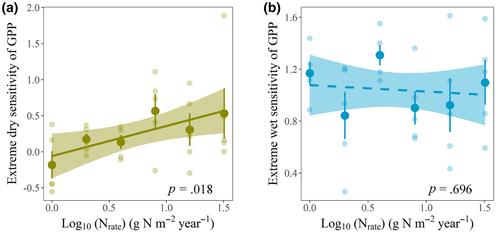当前位置:
X-MOL 学术
›
Glob. Change Biol.
›
论文详情
Our official English website, www.x-mol.net, welcomes your
feedback! (Note: you will need to create a separate account there.)
Nitrogen deposition differentially regulates the sensitivity of gross primary productivity to extreme drought versus wetness
Global Change Biology ( IF 10.8 ) Pub Date : 2024-07-18 , DOI: 10.1111/gcb.17428 Jinlong Peng 1, 2 , Fangfang Ma 1, 2 , Quan Quan 1, 2 , Jiaqiang Liao 1, 2 , Chen Chen 1, 2 , Yiheng Wang 1, 2 , Jiwang Tang 1, 2 , Chuanlian Sun 2, 3 , Qingping Zhou 4, 5 , Shuli Niu 1, 2, 5
Global Change Biology ( IF 10.8 ) Pub Date : 2024-07-18 , DOI: 10.1111/gcb.17428 Jinlong Peng 1, 2 , Fangfang Ma 1, 2 , Quan Quan 1, 2 , Jiaqiang Liao 1, 2 , Chen Chen 1, 2 , Yiheng Wang 1, 2 , Jiwang Tang 1, 2 , Chuanlian Sun 2, 3 , Qingping Zhou 4, 5 , Shuli Niu 1, 2, 5
Affiliation

|
Global hydroclimatic variability is increasing with more frequent extreme dry and wet years, severely destabilizing terrestrial ecosystem productivity. However, what regulates the consequence of precipitation extremes on productivity remains unclear. Based on a 9‐year field manipulation experiment on the Qinghai–Tibetan Plateau, we found that the responses of gross primary productivity (GPP) to extreme drought and wetness were differentially regulated by nitrogen (N) deposition. Over increasing N deposition, extreme dry events reduced GPP more. Among the 12 biotic and abiotic factors examined, this was mostly explained by the increased plant canopy height and proportion of drought‐sensitive species under N deposition, making photosynthesis more sensitive to hydraulic stress. While extreme wet events increased GPP, their effect did not shift over N deposition. These site observations were complemented by a global synthesis derived from the GOSIF GPP dataset, which showed that GPP sensitivity to extreme drought was larger in ecosystems with higher N deposition, but GPP sensitivity to extreme wetness did not change with N deposition. Our findings indicate that intensified hydroclimatic variability would lead to a greater loss of land carbon sinks in the context of increasing N deposition, due to that GPP losses during extreme dry years are more pronounced, yet without a synchronous increase in GPP gains during extreme wet years. The study implies that the conservation and management against climate extremes merit particular attention in ecosystems subject to N deposition.
中文翻译:

氮沉降差异调节总初级生产力对极端干旱与潮湿的敏感性
随着极端干旱和潮湿年份更加频繁,全球水文气候变异性不断增加,严重破坏了陆地生态系统生产力的稳定。然而,是什么调节了极端降水对生产力的影响仍不清楚。基于青藏高原9年的田间操纵实验,我们发现总初级生产力(GPP)对极端干旱和潮湿的响应受到氮(N)沉降的差异调节。随着氮沉降的增加,极端干旱事件进一步降低了 GPP。在检查的 12 个生物和非生物因素中,这主要是由于氮沉降下植物冠层高度和干旱敏感物种比例的增加,使得光合作用对水力胁迫更加敏感。虽然极端潮湿事件增加了 GPP,但其影响并没有改变氮沉降。这些现场观测得到了来自 GOSIF GPP 数据集的全球综合的补充,该数据表明,在氮沉降较高的生态系统中,GPP 对极端干旱的敏感性更大,但 GPP 对极端湿度的敏感性并不随氮沉降而变化。我们的研究结果表明,在氮沉降增加的背景下,水文气候变率的加剧将导致陆地碳汇的更大损失,因为极端干旱年份的GPP损失更为明显,但极端湿润年份GPP的增益却没有同步增加。该研究表明,在受氮沉降影响的生态系统中,针对极端气候的保护和管理值得特别关注。
更新日期:2024-07-18
中文翻译:

氮沉降差异调节总初级生产力对极端干旱与潮湿的敏感性
随着极端干旱和潮湿年份更加频繁,全球水文气候变异性不断增加,严重破坏了陆地生态系统生产力的稳定。然而,是什么调节了极端降水对生产力的影响仍不清楚。基于青藏高原9年的田间操纵实验,我们发现总初级生产力(GPP)对极端干旱和潮湿的响应受到氮(N)沉降的差异调节。随着氮沉降的增加,极端干旱事件进一步降低了 GPP。在检查的 12 个生物和非生物因素中,这主要是由于氮沉降下植物冠层高度和干旱敏感物种比例的增加,使得光合作用对水力胁迫更加敏感。虽然极端潮湿事件增加了 GPP,但其影响并没有改变氮沉降。这些现场观测得到了来自 GOSIF GPP 数据集的全球综合的补充,该数据表明,在氮沉降较高的生态系统中,GPP 对极端干旱的敏感性更大,但 GPP 对极端湿度的敏感性并不随氮沉降而变化。我们的研究结果表明,在氮沉降增加的背景下,水文气候变率的加剧将导致陆地碳汇的更大损失,因为极端干旱年份的GPP损失更为明显,但极端湿润年份GPP的增益却没有同步增加。该研究表明,在受氮沉降影响的生态系统中,针对极端气候的保护和管理值得特别关注。











































 京公网安备 11010802027423号
京公网安备 11010802027423号